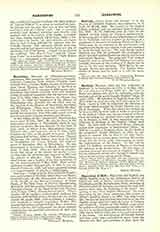

Harrison, JAMES, priest and martyr; b. in the Diocese of Lichfield, England, date unknown; d. at York, March 22, 1602. He studied at the English College at Reims, and was ordained there in September, 1583. In the following year he went on the English mission, where he labored unobtrusively. In the early part of 1602 he was ministering to Catholics in Yorkshire and was resident in the house of a gentleman of the name of Anthony Battie (or Bates). While there, he was arrested by the pursuivants, and together with Battie was tried at York and sentenced to death for high treason. The only charge against Harrison was that he performed the functions of a priest, and that against Battie was merely that he had entertained Harrison. The judge left York without fixing the date of execution, but Harrison was unexpectedly informed on the evening of March 21 that he was to die the next morning. With Battie, he was hanged, drawn, and quartered. The English Franciscans at Douai had his head as a relic for many years.
C. F. WEMYSS BROWN

